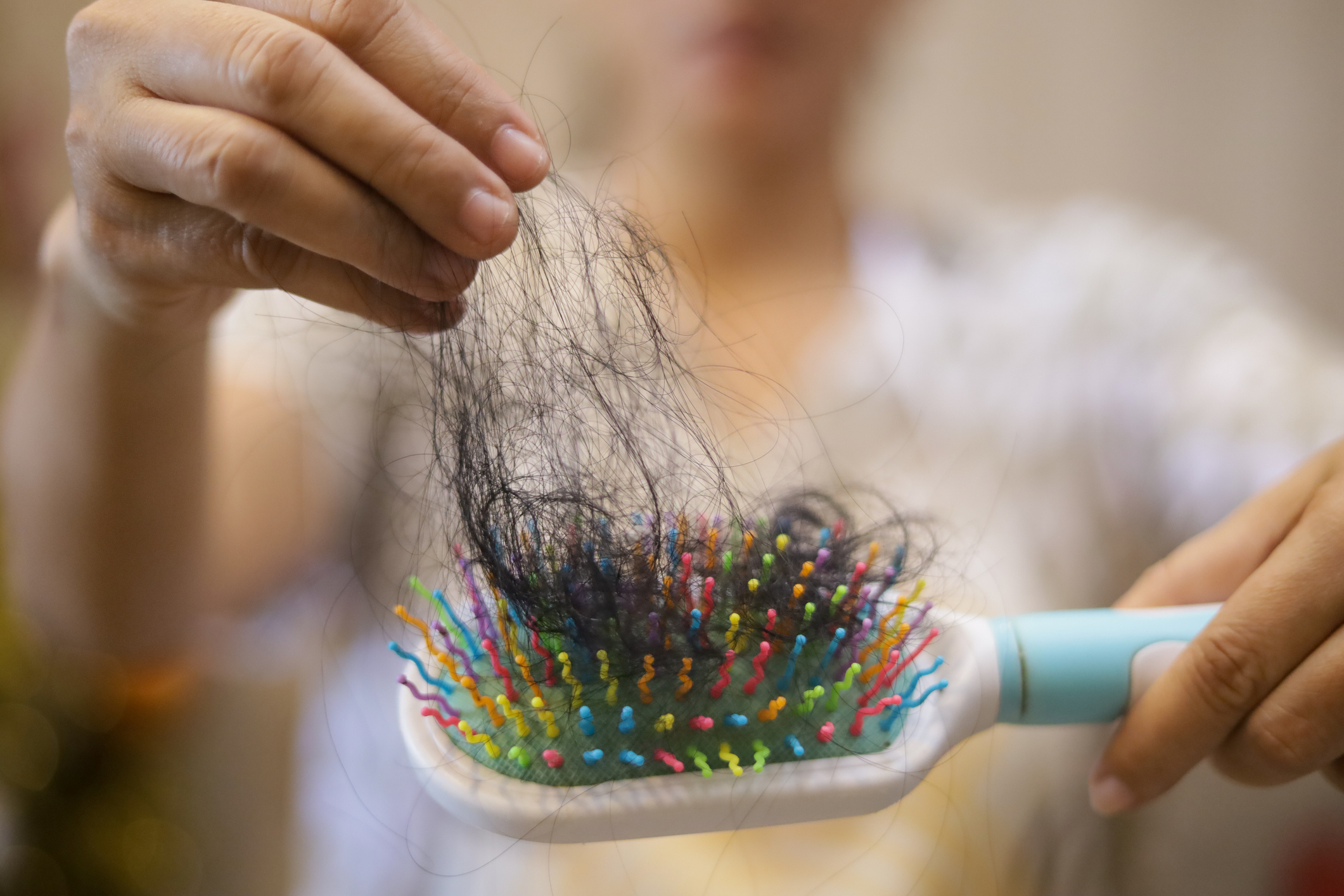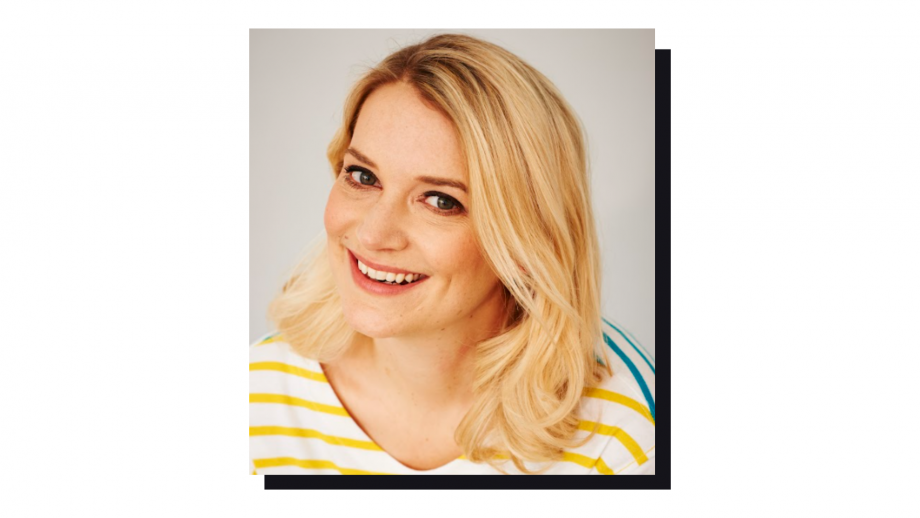Why is my hair falling out? 15 common causes of hair loss, according to the experts
If hair loss is affecting you, the reason behind it might come as a surprise


Hair loss becoming a cause for concern? If you're wondering why your hair is falling out, we’re here to help.
Noticed your hair has started falling out? Many of us damage our hair without realising in minor ways, but an estimated eight million women in the UK currently suffer with hair loss - leaving many looking for ways to speed up hair growth. “Hair has a huge influence on self-esteem and individuality,” says trichologist Anabel Kingsley. “I have clients with hair loss who say they don’t feel like themselves any more.”
Hormones are one of the main reasons for hair falling out. A survey by Viviscal found 50% of women over 25 years old said their hormones, including pregnancy, menopause and PCOS, had contributed to hair loss or hair thinning. And 27% of women felt that diet was a key factor in their hair loss or thinning.
Hair loss can happen at any age, but is particularly common in women over 50 years old due to the menopause. “There’s an increase in hair shedding after 40 years old,” says Stephen Garfit, consultant trichologist at The Leeds Trichology Clinic. “This is usually seen in a loss of hair density, reduction of ponytail volume, or widening of the parting.”
Even exposing your scalp to the sun can increase hair loss. But, don’t despair, there are a number of factors that are treatable.
Why is my hair falling out?
1. Age
Noticed more hair loss over the years? “When women reach the menopause, oestrogen is reduced, which can lead to loss of density,” explains Stephen. “This type of hair falling out is called female pattern hair loss (FPHL). It is usually inherited from the maternal grandmother.” It's sometimes referred to as androgenetic alopecia.
There’s no cure, but over-the-counter medications can be effective, as can laser light therapy. Hair transplantation is another option, but it’s not usually available on the NHS.
Parenting advice, hot topics, best buys and family finance tips delivered straight to your inbox.
2. Hormone imbalance
“During the menopause your hormone levels fluctuate. Oestrogen is responsible for promoting hair growth, while testosterone is responsible for hair thinning,” says Dr Sophie Shotter.
“All hormones start to drop, but oestrogen will drop quicker than testosterone. This means that hair starts to thin and shed, as the testosterone takes over. After menopause, the hair will grow slower and thinner than it did pre-menopause,” she says. Speak to your GP who may offer HRT, although it doesn’t help everyone.
3. Dramatic weight loss
“Diet is key when it comes to the hair and scalp,” says dermatologist and hair loss expert Dr Anastasia Therianou. “Following a strict diet can be linked to hair thinning as you will have lost out on vital vitamins and minerals.”
Eating a well-balanced diet, rich in protein can help. You also need complex carbohydrates (which provide energy to hair cells) and iron (needed to produce hair cell protein). The energy and nutrient requirements of hair cells are great.
4. Trichotillomania
Otherwise known as the hair pulling disorder, this is related to anxiety, depression and post-traumatic stress disorder (PTSD).
“It can happen at any age and in both sexes, although more commonly in women,” says Dr Sharon Wong, a consultant dermatologist at London Bridge Hospital. It typically leaves odd-looking patches of hair loss at different lengths. “Hair pulling provides momentary relief from the underlying stress,” says Dr Wong.
“In adults, trichotillomania is usually more severe and deep rooted. Psychotherapists may use a number of techniques, such as habit reversal and cognitive behavioural therapy, to help patients with this condition.”
5. An unhealthy scalp
Common conditions, such as eczema, psoriasis, and infections, like ring worm, often affect the scalp. The inflammation in the surrounding skin from these conditions can upset the hair growth cycle, resulting in hair loss.
If your scalp is looking and feeling red, inflamed, itchy, flaky and sore it is time to see your GP or dermatologist to have the condition formally assessed, diagnosed and treated. “The longer scalp rashes are left untreated the more likely your hair will suffer as a result,” says Dr Wong.
“Typically conditions like eczema and psoriasis will settle very quickly with medicated (usually steroid-containing) shampoos or liquids. Fungal infections of the scalp are standardly treated with a course of oral anti-fungal tablets and anti-fungal shampoos.”
6. Febrile illness
“The flu, glandular fever and Covid-19 can trigger more hair follicles to prematurely shed,” says Dr Wong. “This increase in hair falling out often appears two to three months after the initial trigger.”
This type of hair loss usually recovers over time without any treatment. “You should start to notice the hair shedding slow down six to nine months after recovery from the illness. Hair volume will gradually return,” says Dr Wong.
7. A vegan diet
The number of people following a vegan diet in the UK quadrupled from 150,000 to 600,000 between the years 2014 and 2019. “Specialists are now seeing more people with nutritional deficiencies and hair shedding,” explains Dr Wong.
Iron deficiency is commonly seen amongst vegetarians and vegans. “See your GP or dermatologist for a blood test to check for specific nutritional deficiencies such as iron, vitamin D and zinc. Adopt a well-balanced diet and make sure it's maintainable in the long-term,” says Dr Wong.
8. Hard water
Around 60% of the UK is classed as having hard water, which means more calcium carbonate and magnesium sulphate in the water. Although washing your hair in hard water won’t necessarily cause hair loss, it can change the texture of the hair. “Hair may look and feel dry and rough due to the minerals on the surface of the hair fibre.”
“A simple solution could be to use a clarifying shampoo as a deep cleanse to remove the mineral deposits several times per month,” says Dr Wong. Want softer water without having to relocate to another spot in the UK? Hello Klean is a shower filter that helps remove chlorine, heavy metals, chemicals, and other impurities from your shower water. A filter costs around £25 on Amazon.
9. Contraceptives
Some types of pill can exacerbate hair loss in some women. “Combined contraceptives (which have both oestrogen and progesterone) are less likely to cause an issue with your hair compared to the progesterone-only preparations such as the minipill,” says Dr Wong.
If you have experienced hair shedding with the mini-pill it would be worth discussing with your GP. You could switch to the combined pill or opt for a non-hormonal contraceptive, such as the copper coil.
Vitamin B deficiency
Food can have a big effect on hair falling out. “Iron is essential, as are B vitamins,” says Dr Shotter. “Veganism can be an issue if there is an imbalanced protein intake. Plus, those who do crash diets with large calorie deficits can experience more shedding when they increase their calorie intake again.”
If you know you are deficient in a certain vitamin or mineral, make changes to your diet and take a relevant nutritional supplement.
11. Thyroid issues
“As women age, thyroid disorders can influence the stimulation or reduction of hair growth,” says Stephen. Other symptoms of a low (underactive) thyroid are tiredness, sensitivity to cold, muscle aches and weight gain. If you suspect you have a low thyroid contact your GP for blood tests.
12. Iron deficiency or anaemia
“Women who have heavy periods can experience chronic anaemia. This can cause hair loss,” explains Dr Therianou. “Following a strict diet can also be linked to hair loss, as can an iron deficiency.” Your GP will be able to tell you if you have an iron deficiency and need a supplement.
“A good diet, such as the Mediterranean diet, involves a balance of carbohydrates, proteins, and vitamins from a varied selection of food groups,” says Dr Therianou. “Don't just go for chicken and vegetables, you need iron-rich foods such as red meat, kale or broccoli.”
13. Stress
Periods of stress or illness can stop hair growth for a short while. “Even a short-term stressful experience, such as losing your job, may lead to temporary hair falling out,” says Dr Therianou. However, stress-related hair loss can happen months after the event. Hair sheds approximately 6-12 weeks later, so many people don’t link it with their previous incident.
“If you’re losing a large amount of hair (more than 100 hairs a day and it’s likely to be noticeable) it can be extremely distressing,” adds Dr Therianou. Removing the cause of stress is the first step. Meditation, yoga and mindfulness can help. Even going for a walk can help you relax.
14. Postpartum hair loss
“After a woman gives birth there is a massive dip in female hormones. The same type of effect can happen when women stop taking the oral contraceptive pill,” says Dr Martin Wade, consultant dermatologist at The London Skin and Hair Clinic.
“This sharp change in oestrogen and progesterone levels can lead to hair loss.”
15. Covid-19 related hair loss
We know that coronavirus is worse than flu and one of the reasons for that is something called long-Covid. Part of long-Covid, some have come to realise, is hair loss.
"Various physical stresses to the body can trigger a type of hair loss called Telogen Effluvium." Alopecia UK explains, "These include infections associated with a high fever, such as Covid-19 but not limited to it – hair loss was common in the Spanish flu pandemic of 1918-19, for example."
This is because hair follicles in the growth phase of the hair cycle, known as anagen, are brought prematurely into the resting phase of the cycle know as telogen. This telogen hair is kept in the follicle for two to three months before being shed, so the hair loss that occurs during Telogen Effluvium tends to begin two to three months after the trigger for it.
"In Telogen Effluvium there is increased daily shedding that occurs diffusely over the scalp leading to increased numbers of hairs on the comb or brush, on the pillow or in the plughole after hair washing."
Alopecia UK also says that there is normally some loss of hair volume. A ponytail might become thinner for example or the hair over the temples might thin. "It is unusual to see thinning elsewhere on the scalp unless the shedding is severe. In the great majority of people hair growth will recover spontaneously over 6-12 months providing the cause is no longer present."
How to deal with hair falling out
1. Keep calm
Stress can cause hair loss. Manage your stress levels with natural remedies to help with thinning hair, such as yoga, Pilates, meditation, swimming, light exercise or mindfulness. Good counselling can help you manage your emotions surrounding hair loss.
How to disguise hair loss
There are ways to make your hair appear fuller. “Ask your stylist to cut your hair shorter and not to layer too much to increase the weight,” advises David Felstead, head of the Hair & Scalp Clinic at Daniel Galvin.
Additionally, watch out for certain hairstyles, like tight ponytails, that can cause hair loss. “Tight hair styles like pigtails or cornrows can cause hair to fall out – something known as traction alopecia,” says Dr Shotter. Hair rollers while sleeping can also cause traction alopecia.
Take a supplement
There are plenty of hair supplements available to help stop hair thinning. However, a trichologist can help check they are right for you.
“If hair loss is down to genetics or hormones, then people will not always benefit from supplements,” says Jane Mayhead, senior trichologist at The Private Clinic of Harley Street. “Patients with poor blood flow receive less nutrients, therefore increasing the level of nutrients in your blood simply won't work.”
If supplements are suitable, it’s still key to maintain a balanced diet. “If your diet is lacking, any nutrients within a supplement will simply be used to keep essential systems functioning, not your hair,” says Anabel.
Improve your diet
Ideally, you should eat plenty of proteins and carbohydrates, advises Anabel. “Include at least a palm-sized portion of protein, such as red meat, chicken, seafood, eggs, quinoa or tofu. Have this alongside brown rice and pasta, whole-wheat bread, couscous, porridge or sweet potato. Carbohydrates provide energy for growth.”
And never skip breakfast. Breakfast is the most important meal for your hair. This is because it’s when energy levels to your hair follicles are at their lowest. Go for poached eggs with whole-wheat toast, quinoa porridge with berries and toasted almonds, and smoked salmon on a bagel. Regular snacking is also key for healthy hair. Try crudités and humous, fresh fruit, or toast with almond butter.
Best products to help with hair loss
Viviscal Densifying Conditioner
Best for: Adding instant gloss
Why we rate it: Often using conditioner on thinning hair can make it look even more fine and lacklustre. This buy changes all that – it’s blended with biotin, keratin and zinc so hair looks glossy but not weighed down.
COST: £7 | Viviscal
Nourkrin Woman For Hair Growth
Best for: Encouraging hair growth
Why we rate it: If you think your diet is causing you to have thinning hair, this food supplement is packed with biotin to support hair health from inside-out.
COST: £66 | Amazon
Nanogen Hair Thickening Keratin Fibres
Best for: A quick cover up
Why we rate it: Ideal for both men and women, this handy stick comes in 10 different shades. It isn't hard to match up to your natural colour. Simply apply to dry hair and the keratin fibres bind with your locks for instant thickness.
COST: £24 | Amazon
Regaine For Women Extra Strength Scalp Foam
Best for: Thinning at the scalp
Why we rate it: Ideal for all ages, this once-a-day treatment comes in a handy foam, making application hassle-free. It’s designed to help thinning at the top of the scalp (vertex). Plus, it’s clinically proven to regrow hair in 80% of women.
COST: £35 | Boots
Alpecin Caffeine Shampoo
Best for: Thinning hair
Why we rate it: Packed with caffeine to energise the hair, this gets to work in just two minutes. Plus, it’s a real bargain buy so good to try before anything else.
COST: £6.50 | Amazon

Faye M Smith is a Senior Health And Lifestyle writer working across Woman & Home, Feel Good You, Woman’s Own and Woman magazine. Having gained an NCTJ postgraduate diploma, Faye has worked for 15 years in journalism, covering a range of lifestyle topics for companies including the BBC, Press Association, News UK and Hachette.
